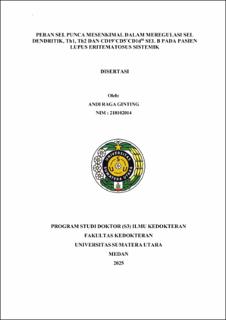Peran Sel Punca Mesenkimal dalam Meregulasi Sel Dendritik, Th1, Th2, dan CD19+CD5+ CD1dhi Sel B pada Pasien Lupus Eritematosus Sistemik
The Role of Mesenchymal Stem Cells in Regulating Dendritic Cells, Th1, Th2, and CD19+CD5+CD1dhi B Cells in Patients with Systemic Lupus Erythematosus

Date
2025Author
Ginting, Andi Raga
Advisor(s)
Munir, Delfitri
Amin, Mustafa Mahmud
Darlan, Dewi Masyithah
Metadata
Show full item recordAbstract
Background: Systemic lupus erythematosus (SLE) is a heterogeneous autoimmune disease characterized by chronic inflammation affecting multiple organs. This disease exhibits high variability in disease progression and prognosis and is significantly associated with autoantibody production. Despite therapeutic advancements, SLE mortality rates remain high, two to three times higher than the general population. Pathophysiologically, SLE involves dysregulation of innate and adaptive immunity, including the critical roles of dendritic cells, T cells, and B cells in producing inflammatory mediators such as IFN-α and IL-18. Imbalances in immune subsets, such as Th1, Th2, and Bregs, further exacerbate this condition. IL-10, as a key anti-inflammatory cytokine produced by regulatory B cells (Bregs), plays an important role in reducing excessive inflammatory responses. Mesenchymal stem cells (MSCs) are known to have strong immunomodulatory effects and show potential in restoring the disrupted immune balance in SLE. However, the specific effects of MSCs on immune subsets such as CD1c+ dendritic cells, CD304+ dendritic cells, Th1, Th2, and CD19+CD5+CD1dhi Bregs remain to be further explored. The mechanisms of these effects in SLE remain unclear. This study aims to investigate the role of MSCs in SLE by measuring the numbers of CD1c+ dendritic cells, CD304+ dendritic cells, Th1, Th2, and CD19+CD5+CD1dhi Bregs, and analyzing the levels of IFN-α, IL-18, IL-10, IL-4, and T-bet that may influence disease activity.
Methods: This study is a true experimental design with a Post Test Only Control Group. The samples were peripheral blood mononuclear cells (PBMCs) from active SLE patients meeting the criteria of SLEDAI > 6 and positive ANA, as well as PBMCs from healthy individuals as controls. PBMCs were treated with mesenchymal stem cells (MSCs) and grouped into control (K), sham healthy group (KS), and treatment group (P1). The variables measured included CD1c+ dendritic cells, CD304+ dendritic cells, Th1, Th2, CD19+CD5+CD1dhi Bregs, and immune mediators IFN-α, IL-18, IL-10, IL-4, and T-bet. Data analysis included descriptive tests, normality tests, and parametric or non-parametric statistical analyses based on data distribution.
Results: Administration of MSCs to PBMCs of SLE patients (P1) significantly reduced the proportion of CD304+ dendritic cells (pDC) and increased CD1c+ dendritic cells (mDC) compared to the control group (K). The Th1 subset also showed a reduction in the treatment group (P1), while Th2 was not statistically significant. The population of CD19+CD5+CD1dhi Bregs increased significantly in the treatment group (P1) compared to the control group. Additionally, IL-10 levels in the P1 group increased significantly (p<0.01). Pro-inflammatory cytokine IL-18 levels decreased significantly in the P1 group (p<0.01). Correlation analysis revealed a positive association between CD304+ dendritic cells and IL-18 levels (r=0.492, p=0.009), Th1 cells and IL-18 levels (r=0.406, p=0.036), as well as the transcription factor T-bet (r=0.449, p=0.019), Th2 and IL-4 (r=0.629, p<0.001), while a negative association was found between Bregs and IL-4 (r=-0.382, p<0.05).
Conclusion: MSCs regulate the percentages of CD1c+ dendritic cells, CD304+ dendritic cells, Th1 cells, and CD19+CD5+CD1dhi Bregs through the release of the anti-inflammatory cytokine IL-10, marked by a reduction in IL-18 levels.
Collections
- Doctoral Dissertations [194]
